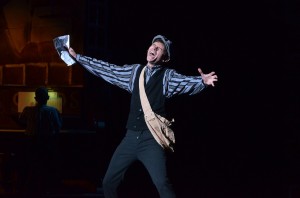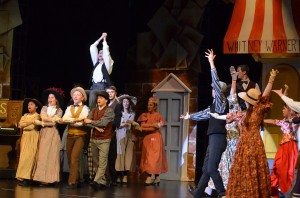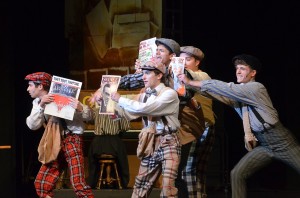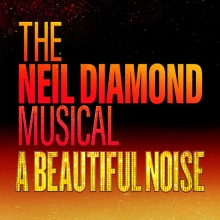Filichia Features: Hello! To Hello! My Baby
Filichia Features: Hello! To Hello! My Baby
The response to Irving Berlin’s White Christmas at the Thespian Festival in Lincoln, Nebraska was good but not great. The kids watching the Lincoln Southwest High production seemed more impressed with the many dance numbers choreographed by Courtney Piccoli than the show itself. Perhaps the seven songs Berlin wrote for the 1954 film were just too far back for ears attuned to the contemporary.
And what about the nine other songs that had been written much earlier? The second-act opener, “I Love a Piano,” recently passed its hundredth birthday. Berlin was America’s favorite composer-lyricist – but that was once upon a time, very long ago. Most of these teens don’t have great-grandparents who were on the scene when some of these songs were popular.
So the applause that greeted the final curtain seemed to say “We love what you did with it,” not “We loved it!” And that made me fear for Thursday’s show: Hello! My Baby, as presented by the thespians from Indian Trail High School in Kenosha, Wisconsin.

Cheri Steinkellner has four Emmys, two Golden Globes and a Tony nomination (for Sister Act). But did she have a good idea when she decided to write a script that would incorporate nearly two dozen public domain songs? Many of the ones she chose were even old-hat before Berlin wrote “I Love a Piano.”
In fact, Steinkellner’s title song (actually “Hello! Ma Baby”) wasn’t even written in the 20thcentury. Okay, it almost made it, having debuted in 1899. Still, how would a 19th century song hold 21st century kids?
More to the point, when the teens looked at the program and saw “I Don’t Care,” did they assume that they’d be hearing that Cheryl Cole song of the same name that includes every four-letter word except “tact”? How would they react when they heard the “I Don’t Care” that was a smash hit in 1905? Would they care?
And yet, Steinkellner immediately captured their attention by making her protagonist be a teen named Mickey McKee (the terrific Joey Belotti). Never mind that it was 1912; the kids could relate to his trying to make some money by working -- although his occupation was one totally unknown to them: song-plugger.
For in the days when “the new wireless radio box” was in its infancy, music was disseminated by having boys in the streets singing songs while holding the sheet music high above their heads. (Think of the Newsies logo but with sheet music replacing a newspaper.) If passers-by liked what they heard, they’d buy the sheet music and would be playing it on their parlor piano that evening.
Mickey would like to be a composer, but he’s unskilled. “A songwriter who can’t write down music?”his friend Betty Gold (the magnificent Haley Wolf) snarls between her sewing chores. “Next you’ll be saying that you can’t play music, either!” This, by the way, is a veiled reference to Berlin’s primitivism; he did his best on a specially made piano that played in F#. When time came to put music to paper, he brought someone else in to do the grunt work.
As Mickey is playing his “simple melody,” Betty does like it – although she suggests that it needsa counter-melody. Betty writes one and the result is Irving Berlin’s first famous quodlibet, “Play a Simple Melody.”
Know the term “quodlibet”? One melody is heard; then comes another and then the two are merged together. It takes a smart music man to write a quodlibet – and that was Berlin -- but Steinkellner shows some smarts, too. Part of her theme is that both man and woman, both Gentile and Jew, should work together, for they equally need each other to succeed.

That’s easier said than done in 1912. Here comes Johnny Giovanni and his two stooges, Dickie the Duck and (the semi-anachronistically named) Kid Vicious. Steinkellner ameliorates the situation by having diminutive Josh Bush portray Johnny, so he seems more of a paper tiger. But he does want the rent on Gold’s establishment and Mickey must admit that “a song won’t pay the rent or protection.”
Betty is ready to hit the streets to promote their song, but Mickey insists that “Song-plugging is man’s work.” Alas, 1912 women had to take menial jobs no matter how much talent they had. Betty’s sister Frances has a point, too, when she says “A dream is a want you can’t have.”
So Betty Gold drops her gender and her background and becomes Buddy O’Reilly to get ahead. Buddy tries to soothe the savage extortionist with that 1917 favorite “Oh, Johnny (how you can love).”
The WASP intolerance of immigrants provides additional conflict. Stanford J. Tierney’s ancestors may not have come over on the Mayflower, but by the way he acts, they were only a few boats behind.
Ah, but in affairs of the heart, there are no boundaries. At a swank ball, his debutante daughter Alice takes a shine to Buddy. But “he’s” Betty, who’s used to following when dancing, and must suddenly learn how to lead.
Because Mickey expects Betty to attend the ball, we have a reverse situation from the one in WHERE’S CHARLEY? Here it’s the woman who’s pretending to be a man who must rush out and return as a woman. To complicate matters, Junior Tierney, Stanford’s son and Alice’s brother, is smitten with Betty to the point where he’s moved to sing “If You Were the Only Girl in the World.”

Here’s where it could have all gone sour. This song from 1916 is a terribly sentimental waltz. Give Colin Robertson credit for delivering the song in a straightforward, unapologetic and sincere way. We always hear about “trusting the material,” and Robertson certainly did. Who’d expect that this number could possibly get (to use the name of a TV show on which Steinkellner has worked) cheers? But it did. And later, when Mitchell Haller and Rebecca Willer, playing two minor characters, sang that 1919 standard “You’d Be Surprised,” you’d be surprised at the spectacular response they got.
Back to the plot: The immigrants don’t feel welcome and they leave – although Betty has a smart rationale when she tells Mickey “Our music can go all the places we can’t.”
Stanford isn’t taking any chances; he tells his children “You are never to return to the Lower East Side again.” And because this was “The Gilded Age” when parents could be tyrannical and kids did nothing but obey, Tierney’s son and daughter must follow.
Of course we expect a happy ending, for in America, democracy must rule in matters of love. But Steinkellner certainly doesn’t take the easy way out. Mickey finds himself inextricably drawn to Buddy, and while he still thinks that he’s dealing with a man, he’s ready to commit. (An old friend of mine once put it nicely: “If you love the person, you love the body.”)
Needless to say, Buddy does reveal “himself” to be Betty, so it’s a male-female couple we’ll celebrate at the final curtain. But hold on! Steinkellner has a big surprise in store when Dickie and Kid suddenly reach out and tenderly take each other’s hand.
And the kids go wild. That it’s happening fewer than seven hours after The Supreme Court handed down its landmark decision on same-sex marriage might have had something to do with it, but theater kids tend to be pretty open-minded, anyway. What a stroke of fate that long before this SCOTUS decision was in the works, Steinkellner had decided her eleven o’clock number would be the 1921 hit “There’ll Be Some Changes Made.” Better still, how about the line she’d written months or years ago: “This is America! Love is for everyone!”
At show’s end, a large sheet comes down with the lyrics (a la “No Time at All” in PIPPIN) to “Hello, Ma Baby.” The melody has so tickled the kids that they sing along without a pause. Some days later, Michael Portantiere, my partner-in-podcast on Broadway Radio, say that the kids might have known it from a famous Warner Brothers’ Merry Melodies cartoon from 1955. “One Froggy Evening” has a building-demolisher find in a cornerstone a safety deposit box from which a frog jumps out, dons a hat, grabs a cane, then struts and roars “Hello ma baby! Hello ma honey! Hello ma ragtime gal!”
Well, maybe that’s the reason. Are kids still watching cartoons that are almost as old as the score of White Christmas? I’ll assume that “Hello Ma Baby” -- as well as “Hello! My Baby” – scored simply because kids liked both.
Bless the new shows, but a balanced musical theater diet comes from the four mood groups: Golden Age musicals, musical plays, pop operas and rock musicals. We’ll get some of each here in this thrilling week in Lincoln – and may they all be as successful as Hello! My Baby. You’ll be able to license it before the year is out.
 You may e-mail Peter at pfilichia@aol.com. Check out his weekly column each Monday at www.broadwayselect.com, Tuesday at www.masterworksbroadway.com and Friday at www.kritzerland.com. His book The Great Parade: Broadway’s Astonishing, Never-To-Be Forgotten 1963-1964 Season is now available at www.amazon.com.
You may e-mail Peter at pfilichia@aol.com. Check out his weekly column each Monday at www.broadwayselect.com, Tuesday at www.masterworksbroadway.com and Friday at www.kritzerland.com. His book The Great Parade: Broadway’s Astonishing, Never-To-Be Forgotten 1963-1964 Season is now available at www.amazon.com.
Read more http://mtiblog.mtishows.com/filichia-features-thousands-of-thespians/

























